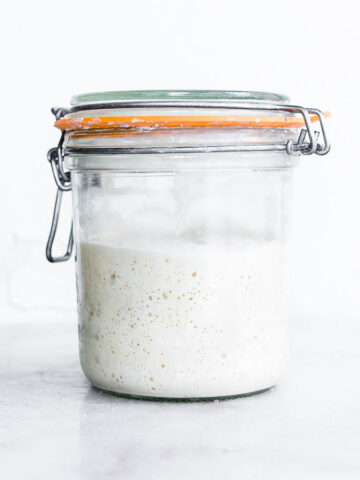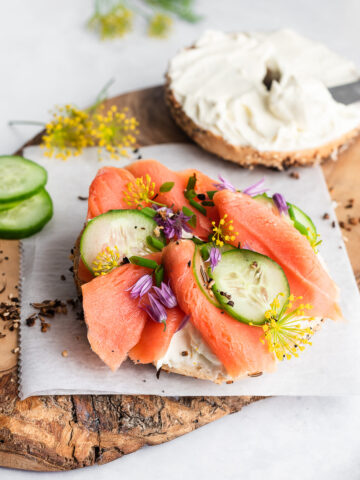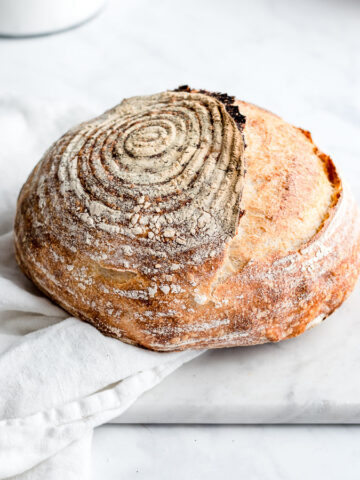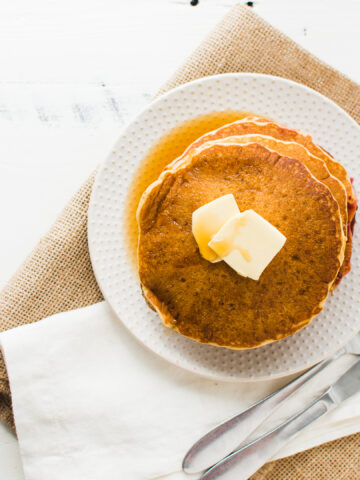One of the best things about baking sourdough bread is that its ingredients are fairly simple: flour, salt, water, and starter culture. Later, when you've become more comfortable with baking sourdough, you'll be able to intuitively flavor your breads, adding ingredients like spices, dried fruit, nuts, cheeses, herbs, and vegetables to create something that's uniquely your own.
In addition to basic ingredients, you'll also need a few pieces of key equipment to help you effectively culture your sourdough starter and bake crusty, artisan-style breads. Jars, whisks, and mixing bowls are all helpful for beginning bakers, while grain mills are helpful for those really committed to baking their breads.
Sourdough Baking Ingredients
Flour. You will need grain-based flour (no almond or coconut flour here!). So bread flour, all-purpose and whole einkorn flour, spelt flour, emmer flour, and rye all make great choices. We'll get into more detail about how to choose the right flour for your starter in a few days.
Water. To feed your starter you should use filtered or dechlorinated water. The additives in municipal tap water can make it difficult for the wild bacteria and yeasts in your starter to establish themselves successfully.
Salt. Salt helps to strengthen the protein bonds that help bread rise effectively, and it provides a base for and an amplification of flavor. I like to use unrefined sea salt. Iodized table salt can have a tinny, faintly metallic taste, and unrefined sea salt includes a wide variety of trace minerals.
Established Starter Culture. While not a necessity (you can make a wild starter), an established starter like these can give your sourdough a boost and is good for newcomers to sourdough. I recommend using a white flour starter (like the San Francisco Sourdough) for sourdough newbies. I'll explain more in tomorrow's email.
Basic (and not so basic) Equipment for Sourdough Baking
A Jar. You'll need a jar or crock in which to store your sourdough. A Fido jar with a strong seal works really well to store sourdough, and to prevent it from drying out. Your jar should be at least twice as big as the volume of your starter. So aim for at least a quart-sized jar. You can also use mason jars, if you like.
A Dough Whisk or Wooden Spoon. You'll need to vigorously incorporate flour, water and starter together, and one of the best ways to do that
Mixing Bowls with Tight-fitting Lids. Mixing bowls help you mix your dough, and they give it a place to rise. With tight-fitting lids, your dough won't dry out!
Kitchen Scale. For consistent results, you'll want to weigh your ingredients both when you feed your starter and when you bake bread. So a scale is a must.
Proofing Baskets and Linens. Proofing baskets and linens help your bread to keep its shape while it rises. Since we're working with relatively high-hydration artisan-style breads, a proofing basket is an essential tool.
Fourneau Oven. In order to develop a beautiful crisp crust, and a lofty and airy crumb, you need to bake with steam and to keep an even temperature while baking.
Grain Mill. There is nothing like real sourdough bread prepared from freshly milled grains. If you're looking to take your baking to the next level and bake truly nutritious, amazing whole grain breads, a grain mill is valuable.
A Lame. A lame is a wooden tool equipped with a razor blade that helps you to score bread precisely and effectively. Using a lame is how artisan breads get such gorgeous patterns, and it also prevents them from tearing when they rise during baking. A lame produce the best results, but you can also score bread with a serrated knife.








